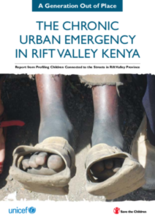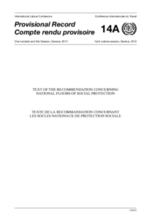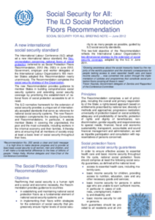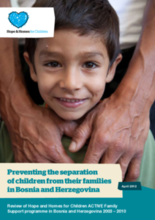Displaying 181 - 190 of 241
In this report, Retrak examines the situation of girls living on the streets in Kampala, Uganda and Addis Ababa, Ethiopia, and provides key recommendations on the development programs required to address their needs. The report urges for scaling up services, building new facilities for street girls, and building staff capacity to handle issues related to this population.
This report presents the findings from a two-year peer research project which includes the testimony of more than 300 young people with care experience in Albania, the Czech Republic, Finland, and Poland. More than 40 care leavers from the four countries were selected and trained to play an active role in the all aspects of the projects. The interviews revealed widespread inadequacies regarding the process of leaving care, promoting the research team to draw up recommendations to address them.
Research was conducted in five Rift Valley towns in Kenya in 2011 to understand the link between emergencies and the perceived increase of children joining the streets. Findings show that emergencies such as Post Election Violence and drought have caused children to join the streets. By far the biggest reason for children joining the streets was food insecurity. The authors advocate for an urgent, large-scale response to place children currently connected to the streets in durable situations in tandem with a multi-sectorial development approach to tackle and address the root of the crisis.
This document outlines an overarching National Health Policy for Zambia.
This article describes the results of a meta-analytic review aimed at providing an estimate of the prevalence of physical and emotional neglect by integrating prevalence figures from the body of research reporting on neglect. It discusses and makes recommendations on the dearth of studies investigating the prevalence of child neglect, despite evidence of its severe consequences on millions of children, and a global prevalence estimated to be above 15%.
This International Labour Organization (ILO) document introduces a new international standard adopted in June 2012, the Social Protection Floors Recommendation, 2012 (No. 202), that provides guidance to member States in building comprehensive social security systems and extending social security coverage by prioritizing the establishment of national floors of social protection accessible to all in need.
This International Labour Organization (ILO) brief introduces a new international standard adopted in June 2012, the Social Protection Floors Recommendation, 2012 (No. 202), that provides guidance to member States in building comprehensive social security systems and extending social security coverage by prioritizing the establishment of national floors of social protection accessible to all in need.
This document provides an outline for the competencies, training and skills needed by healthcare staff to work with looked after children at different professional levels in the UK. It recognizes that all health staff should have access to appropriate training, learning opportunities, and support to fulfill their roles and responsibilities, particularly when it comes services provided to looked after children.
The national Adolescent Health Strategic Plan 2011 to 2015 (ADH-SP 2011- 2015) for Zambia, seeks to outline the strategic framework for promoting the planning, organization and delivery of appropriate, accessible, efficient and effective Adolescent Friendly Health Services (ADFHS) throughout the country.
Hope and Homes for Children has been implementing ACTIVE Family Support in Sarajevo Canton in BiH since 2003. The program consists of two elements: the prevention of separation of children from their parents as the primary focus, and the reintegration of separated children from institutions back into their biological families. This unique and holistic program is tailored to the individual needs of each child and family and it is built on the following core values: partnership, respect, inclusion, sustainability and the best interest of the child.









